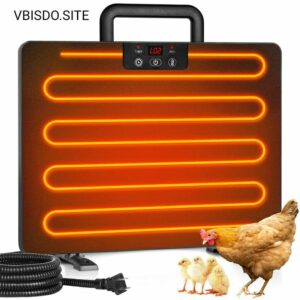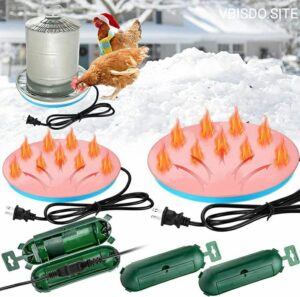Raising hens has seasonal difficulties; one of the toughest is preventing water from freezing in winter. The health of your flock may rapidly deteriorate without regular access to fresh, unfrozen water. This is where a solar warmer for chicken water shows to be a game-changer—off-grid, affordable, and environmentally responsible way to keep poultry hydrated all year long.
This thorough guide will lead you through the advantages, varieties, installation advice, and maintenance of solar-powered water heaters for chickens regardless of your level of backyard enthusiast or small-scale poultry farmer.
Why Would One Use a Solar Heater for Chicken Water?
Chickens need water as if not more under freezing conditions than in warmer months. Frozen water bowls cause stress, dry-out, and a reduction in egg output. Although conventional electric water heaters run, they have limited usage in off-grid or isolated coops, high energy costs, and fire hazards.
Even in winter, a solar chicken water warmer runs on solar energy to maintain drinking temperature of water. The main grounds for switching are as follows:
✅ Ecologically Friendly and Energy-Efficient
Renewable, free, and sustainable is solar energy. Rising energy costs or growing carbon impact won’t cause you concern.
✅ Capability for Off-grid
The best answer if your chicken coop is distant from a power source is a solar-powered water warmer. Just pure energy—no wire or utility hookup.
✅ Less Dangerous for Your Flock
Particularly in coops made of wood or straw-lined construction, electric heaters create fire risks. Solar heaters greatly lower the electrical hazards.
✅ Reasonably Affordable
Following the first configuration, running expenses are almost nonexistent. There is little maintenance; most solar systems are designed to last years.
Chickens’ Solar Water Heater Operation
Though they come in different shapes, most solar warmers meant for chicken waterers run based on the same ideas:
-
Gather solar panel energy from the sun and translate it into electricity.
-
Optional battery storage lets extra solar energy be kept for use during dark evenings or cloud cover.
-
Warms the water to stop it from freezing using heating element. Usually placed either beneath or around the water container.
-
Optional thermostatic control lets the heater turn on automatically as temps decrease.
These parts cooperate to provide constant access to unfrozen water even as such temperatures as -20°C (-4°F).
Solar Chicken Water Heaters: Types
Your budget, coop design, and environment will determine the different kinds of solar heaters you may use.
1. Integrated Solar Heated Waterers
Included with these all-in-one systems are a built-in heating element, battery, and solar panel. They run plug-and-play and call for no electrical wiring.
2. Solar Panel Plus Heated Base Configuration
A solar panel will run a heated water base or pad that heats the waterer from beneath. This choice lets you update certain parts and is more versatile.
3. Passive Solar Water Heaters
These directly employ sunlight—no electric components—by use of dark-coloured containers that collect solar heat. One may aid to maintain warmth using insulation. Although cheaper and simpler, they perform less well in really cold conditions.
4. Handy Solar Chicken Water Heater
If you’re handy, creating a do-it-yourself solar water heater may be both fulfilling and reasonably priced. You may create a unique solution for your coop using simple items as black plastic tubs, glass coverings, insulation, and solar panels.
Easy Setup for a DIY Solar Heater for Chicken Water
Here is a simple DIY setup’s brief summary:
Materials:
-
Black rubber tub or bucket
-
Double-pane glass, also known as Plexiglass, traps heat
-
Insulation material—straw, foam board, etc.
-
Ten to twenty watt small solar panel
-
Low-watt heating pads or poultry water heaters
-
Switch for thermostats (optional)
Steps:
-
If your container is not black already, paint it black to help it absorb more heat.
-
Wrap insulation over the sides and base of your water container box.
-
Install your solar panel on the coop roof for best sun.
-
Placed beneath the water container, connect the panel to your heating pad.
-
Trap heat and stop it from leaving using the glass cover.
-
Install a battery and thermostat controller for backup heat if routinely low temps fall below freezing.
🔧 Pro Tip: Try your configuration before the first frost. Over a few days track sun efficiency and water temperature.
Important Specifications to Search For in a Solar Chicken Water Heater
When purchasing or constructing a solar chicken water warmer, give these key considerations top importance:
-
Verify it’s waterproof and snowproof.
-
12V DC systems are safer for outdoor application low voltage safety.
-
Look for designs with insulation and energy economy.
-
Useful during long winter evenings or days of cloud cover is battery backup.
-
Chickens may be dirty; select designs that are simple to clean and sanitise.
Suggestions for Longevity Maintenance
Although solar heaters are quite low-maintenance, a few basic habits will help them to work efficiently:
-
Look monthly for snow, dust, or bird droppings on solar panels.
-
Look over connections and wires for corrosion or damage.
-
Frequent cleaning of water containers helps to avoid dirt or algae accumulation.
-
Before the winter arrives, test performance.
-
Store passive systems indoors in the summer to extend material lifetime.
Top Solar Chicken Water Heaters (2025 Selected Brands)
Here are some dependable brands and models you should give thought:
-
Combining Renogy Solar Panels with Farm Innovators heated base
-
Harris Farms heated poultry drinker using a solar converter kit
-
Premier One Supplies Heated Poultry Waterers (DIY solar compatibility)
-
Thermo-Poultry Heated Fountain and Jackery solar station
-
SunRise DIY Solar Heater Kit (modular, reasonably priced budget design)
In General, a Solar Heater for Chicken Water is a Wise Investment
Year-round hydration for your hens is very vital, particularly in colder months. For small-scale producers as well as backyard keepers, a solar warmer for chicken water is a creative and sensible option. It saves your flock, lowers your need on power, and saves energy.
With so many choices in 2025—commercial, modular, or DIY—the change to solar is simpler than it has ever been. Now is the ideal moment to adopt solar for your poultry water heating requirements if your goals are sustainability, off-grid independence, and superior animal care.

Common Questions
❓ Is a solar chicken water warmer suitable for overcast conditions?
Indeed, most systems including a decent insulation or battery backup will still run as expected. Performance in passive systems might suffer with extended cloud cover.
❓ Is a solar water heater safe for chickens?
Clearly. Proper installation of solar systems lowers fire and electrocution hazards as they are safer than electric corded heaters.
❓ Chicken water solar heaters last for how long?
Good-quality solar systems may run five to ten years or more with little upkeep.
